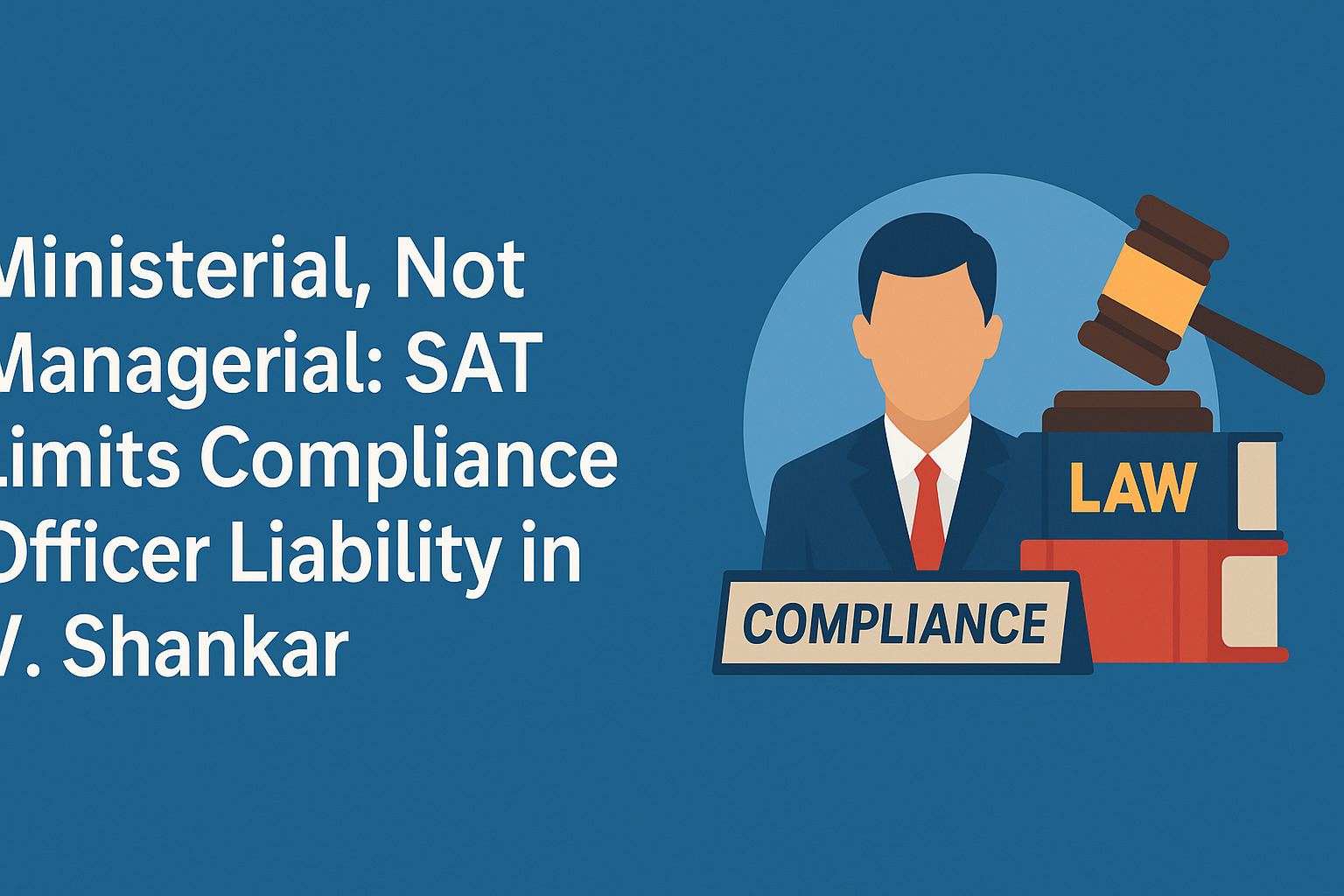View News
12 Jun 2025
Detailed-Case-Analysis-Limiting-Compliance-Officer-Liability

Detailed Case Analysis: V. Shankar v. SEBI (SAT Judgment, 5 May 2025)
| Particulars | Details |
|---|---|
| Case Title | V. Shankar v. SEBI |
| Court/Tribunal | Securities Appellate Tribunal (SAT) |
| Date of Judgment | 5 May 2025 |
| Background | V. Shankar, former Company Secretary & Compliance Officer of DCHL, signed a public buyback announcement (6 May 2011), allegedly based on manipulated financial data. SEBI held him liable for misleading disclosures in violation of SEBI regulations and imposed a penalty of ?10 lakh. |
| SEBI’s Allegation | - DCHL fraudulently inflated free reserves and financials by offloading liabilities to an associate entity (DCM) at year-end and reinstating them later. - Shankar signed the buyback public announcement without verifying the accuracy of the unaudited/manipulated accounts. |
| Legal Basis for SEBI’s Action | - Section 15HA, SEBI Act (Fraudulent/unfair trade practices) - Sections 12A(a)-(c) of SEBI Act - Regulations 3 & 4 of SEBI (PFUTP) Regulations, 2003 - Sections 68 and 77A of the Companies Act, 1956 - Regulation 19(3) of SEBI (Buyback of Securities) Regulations, 1998 |
| Key Provision in Question | Regulation 19(3) of Buyback Regulations: “The company shall nominate a compliance officer… for compliance with the buy-back regulations and to redress the grievances of investors.” |
| Penalty Imposed | Rs 10 lakh on V. Shankar |
| Supreme Court Intervention | - Initially, SAT quashed the SEBI order. - Supreme Court remanded the case back, criticizing SAT for interpreting the compliance officer's role too narrowly under Regulation 19(3). - Directed SAT to re-examine in light of compliance obligations, not just grievance redressal. |
| SEBI’s Argument | - Compliance officers must ensure compliance, not merely relay information. - Reliance on unaudited/manipulated data without due diligence violates their duty. - Officers are not merely clerical—they act as gatekeepers. |
| V. Shankar’s Argument | - Compliance officers do not verify financial accuracy. - Authentication is procedural and based on board-approved/auditor-certified records. - Directors, not compliance officers, are accountable for disclosures in public announcements. |
| SAT’s Key Observations | - Compliance officer's role is ministerial, not managerial. - Regulation 19(3) does not create a duty to re-audit or question board/auditor decisions. - Section 215 of Companies Act, 1956 mandates authentication, not verification. - Liability cannot be imposed absent statutory basis. |
| Precedents Cited by SAT | - Prakash Kanungo v. SEBI (disclosure of insider trades—officer not liable to verify). - New Delhi Television Ltd. v. SEBI (compliance officers are employees, not directors). - Bhuwneshwar Mishra v. SEBI (differentiated—direct obligation to file disclosures existed in that case). |
| SEBI’s Broader Regulatory Interpretation | - SEBI has been expanding compliance officer’s role through informal guidance (e.g., Kirloskar Chillers, 2017) and past orders (e.g., Satyam case). - LODR (April 1, 2025 amendment): Compliance officer must now be KMP and held at a senior level within the company, reporting to the board. |
| SAT’s Final Ruling | - Set aside the Rs. 10 lakh penalty. - Held that V. Shankar performed a formal, ministerial role. - No legal basis for expecting him to verify or audit financial statements. |
| Jurisprudential Conflict | - SEBI’s View: Compliance officers must proactively ensure regulatory adherence. - SAT’s View: Compliance officers are not responsible for re-auditing board-approved documents unless statute explicitly says so. - SC’s View (tentative): leans more toward SEBI’s expansive interpretation. |
| Implications for Compliance Officers | - SAT ruling offers relief to compliance officers from disproportionate liability. - Sets precedent that formal authentication ? liability for fraud unless intent or knowledge is proven. |
| Future Outlook | Awaited clarity from Supreme Court in future appeals. The jurisprudence on compliance officer liability remains unsettled, especially post-LODR 2025 amendments. |
"Unlock the Potential of Legal Expertise with LegalMantra.net - Your Trusted Legal Consultancy Partner”
Disclaimer: Every effort has been made to avoid errors or omissions in this material in spite of this, errors may creep in. Any mistake, error or discrepancy noted may be brought to our notice which shall be taken care of in the next edition In no event the author shall be liable for any direct indirect, special or incidental damage resulting from or arising out of or in connection with the use of this information Many sources have been considered including Newspapers, Journals, Bare Acts, Case Materials , Charted Secretary, Research Papers etc

